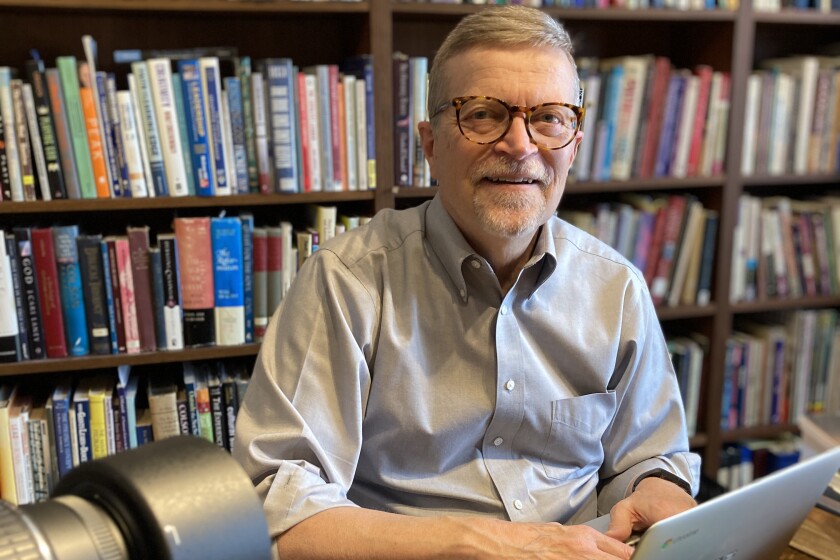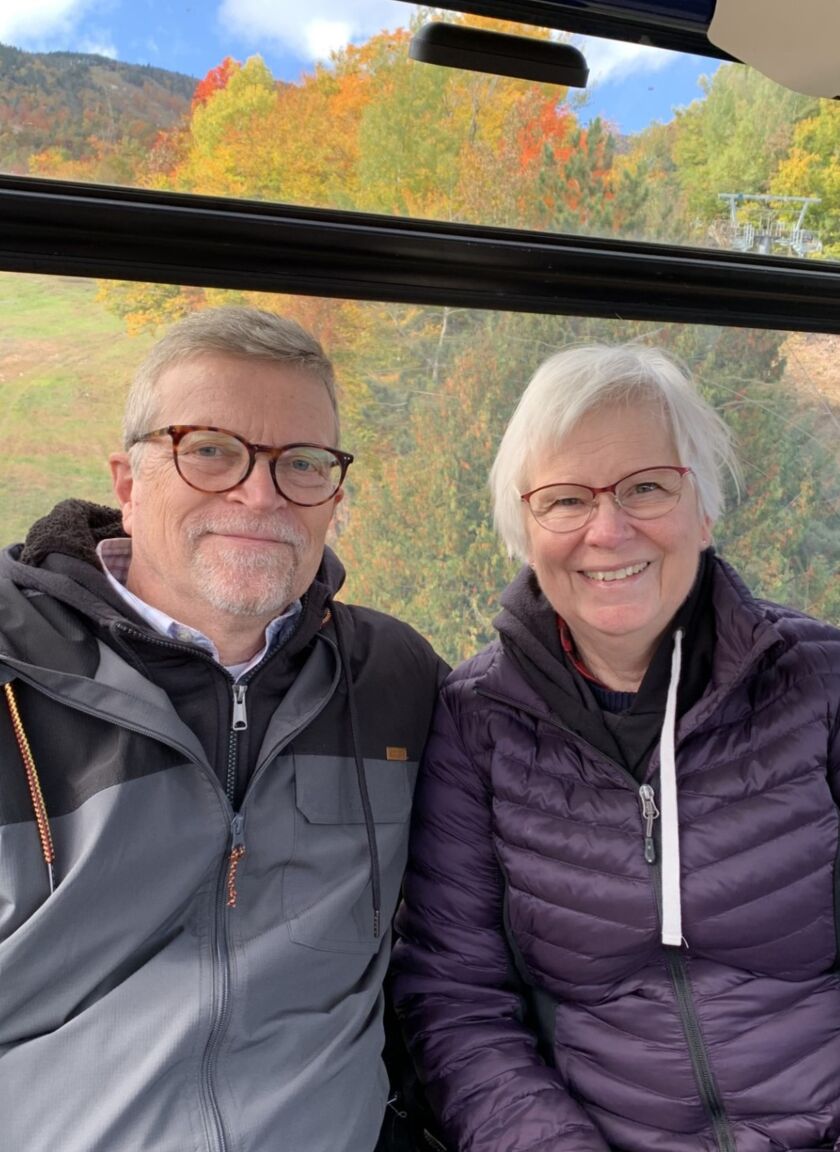
PEQUOT LAKES, Minn. — If Dave Hietala were challenged to turn a current political slogan into one conformed to his heart by changing one word only, it might be “Make America Thoughtful Again.”
“The cable news shows celebrate their bias and divisiveness,” says Hietala. “There must be a new, personal option for sanity, thoughtfulness and caring among God’s people.”
This forms the impetus for a brand-new online community he’s founded to help bring our wounded, divided world back to its senses. Or, borrowing from U2’s lead singer Bono, to “tear a corner off the darkness” by fostering “agents of reconciliation in all places that populate our own little worlds.”
The brand-new group, “Thoughtful Faith,” will begin its online discourse next month, using widely acclaimed author C.S. Lewis’s “The Weight of Glory” as a starting point. The idea is to use good literature to facilitate heart-changing conversations among Christians and others of goodwill.
According to Hietala’s thoughtful.faith website, discussions will have three main goals: new understandings, fresh reflection, and conversations in service to others.
“In the current moment of name-calling and anger, there needs to be a setting for thoughtfulness that leads to caring,” he says.
And as Hietala’s good friend Bob Osborn says, there’s no better person to facilitate such an audacious effort. “I have an extremely high regard for this guy,” Osborn says. “No one will feel like they’ve been taken advantage of or wasted their time. He’s unusually skilled, perceptive and thoughtful — the kind of person you’d want to spend an hour or two within discussion.”
Seeing over the horizon
The two met in early 1999, when Hietala was involved in a ministry out of Little Falls, Minnesota, encouraging the faithful to a deeper level of thinking. They later worked together for a time at the University of Minnesota, where Osborn was leading a Christian study center, sharing their passion for improving dialogue among Christians.
“For the vast majority of churches today, there’s no context or program that enables people who want to think at a deeper level know what it means to apply their faith to human problems,” Osborn says. “That’s not a critique of pastors; it’s just a reality.”
Hietala’s venture, he says, will provide people of varying perspectives with ways of discussing deep ideas in a respectful yet highly engaging way, fostering appreciation for each other even in disagreement. “Dave has always been a guy who sees over the horizon. He sees much farther ahead than most, and he’s willing to dive in and do something that is needed, long before people even realize it.”
Osborn also appreciates the use of good literature as a launching tool. “He’s started with something that’s meaty, yet charmingly written, from a very famous author: C.S. Lewis,” he says. It will be followed in March with a book about humility in public engagement.
The Christian community isn’t immune from the propensity for people to “blow up and cancel each other,” he says. He recalls meeting Christian philosopher Dallas Willard, who was questioned after a lecture about why he didn’t demand the last word. “He had learned there was so much to gain by not choosing to have the last word and leaving people with the sense of their dignity.”
Christ himself modeled this, Osborn notes. “Most questions he responded to with another question. You immediately remove some of the tension from the room and give the other person time to think.”
Though social media has put polarity “on steroids,” Osborn says, it started long before Facebook emerged. “Prior to that, in mass media, we had loud mouths who attracted big audiences by saying stupid, outrageous things, their garishness being off the charts.”
Hietala has tapped into great thinkers of the past to help guide his mission, quoting St. Bernard of Clairvaux, who once named three motivations for seeking knowledge: curiosity, vanity and service to others.
“Right now, there are three frames of seeing the world,” Hietala says. The first is exploitative. “Me winning and you losing.” The second is transactional. “I win, you win.” The third is redemptive. “You win, and I’m okay if I lose.”
Rather than retribution—a word that has seeped into many Christian evangelical circles, he says Thoughtful Faith will focus on redemption, ask “So what?” and follow with, “Now what?”
The journey that led him here

Born in 1956. Hietala grew up in a Christian home in northeast Minneapolis at an idyllic time for the faithful when he and his buddies attended catechism class on Saturday mornings, along with church on Wednesdays and Sundays.
While he never abandoned his faith, it was more hidden during his college years, he says, until he met his wife, Mary, a teacher. “That started the strengthening of my faith,” noting that she exhibited “the kind of quiet strength that shows in followers of Jesus,” and inspired him.
In 1999, the family bought a local Christian bookstore in Little Falls, The Good Book Store, offering them a chance to witness “the breadth and depth of God’s people.” But it was tough, raising a family while working retail, he says, recalling his young daughter lying in the music section on a sleeping bag, “sacked out with the DVDs.”

They eventually sold the business. In 2003, Hietala obtained his philosophy doctorate in adult and continuing education administration. He began working with a Christian ministry based in Europe that focused on being better learners and in the service of others.
His final stint before moving back to Minnesota to be closer to family, from 2005 to 2009, brought him to Messiah College in Pennsylvania, where he worked with a community that was 90% non-white.
His years in the higher-education realm, including his most recent post as vice president of academics for Central Lakes College in Brainerd and Staples, Minnesota, have put him in touch with many thoughtful, often young, people. “Students ask really great questions, which is always kind of fun,” he says. “There’s nothing better than a conversation that’s got the room buzzing.”
He wants to keep that buzz going in a positive direction, tapping Scripture verses like Romans 12:2, encouraging that we not conform ourselves to the world’s patterns, but to “be transformed through the renewal of our minds.”
Mary says her husband has always been an ideas person, but this latest idea is his best yet: the culmination of a life seeking the Lord and a desire to foster life-giving dialogue.
“I think Thoughtful Faith is going to be the thing that captures his vision and interest all through the years,” she says, noting that participants will find a welcoming, calming voice in her husband. “He very much has a heart to be faithful to what God has called us to do, and especially in the culture.”
“Thoughtful Faith seeks to be an oasis for followers of Jesus, offering depth, caring and a balm for these times,” Hietala says, inviting those interested in learning more, and/or registering to participate, to visit www.thoughtful.faith .
[For the sake of having a repository for my newspaper columns and articles, I reprint them here, with permission, a week after their run date. The preceding ran in The Forum newspaper on Jane 26, 2024.]

Leave a Reply